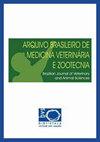去势和输精管切除术对大鼠某些氧化应激参数和血液激素水平的影响
IF 0.5
4区 农林科学
Q4 VETERINARY SCIENCES
Arquivo Brasileiro De Medicina Veterinaria E Zootecnia
Pub Date : 2023-07-01
DOI:10.1590/1678-4162-12982
引用次数: 0
摘要
摘要输精管切除术和去势术是控制男性生殖的首选手术方法。性功能在输精管切除术中可逆地终止,而在去势术中则被不可逆转地去除。在这些过程之后,观察到激素和氧化应激参数的变化。在本研究中,我们研究了输精管切除术和去势手术对大鼠血液中卵泡刺激素(FSH)、黄体生成素(LH)、睾酮、一氧化氮(NO)和丙二醛(MDA)水平的影响。分析结果表明,与假手术组和输精管切除术组相比,去势组的FSH、LH、NO和MDA水平升高(p<0.05),睾酮水平降低(p<0.05)。考虑到从本研究中获得的数据,当在大鼠中比较这两种手术(输精管切除术和阉割)时,人们认为输精管切除术是一种更健康的方法,因为它是可逆的,不会影响激素水平,也不会增加氧化应激。本文章由计算机程序翻译,如有差异,请以英文原文为准。
Effect of castration and vasectomy on some oxidative stress parameters and blood hormone levels in rats
ABSTRACT Vasectomy and castration are the most preferred surgical methods to control reproduction in males. While sexual functions are terminated reversibly in vasectomy, they are removed irreversibly in castration. After these processes, changes are observed in hormones and oxidative stress parameters. In this study, we investigated the effects of vasectomy and castration operations on blood follicle stimulating hormone (FSH), luteinizing hormone (LH), testosterone, nitric oxide (NO) and malondialdehyde (MDA) levels in rats. As a result of the analysis, it was determined that FSH, LH, NO, and MDA levels increased (p<0.05) and testosterone levels decreased (p<0.05) in the castration group compared to the sham and vasectomy groups. Considering the data obtained from the present study, when the two operations (vasectomy and castration) are compared in rats, which are preferred for the control of reproduction, it is thought that vasectomy is a healthier method because it is reversible, does not affect hormone levels, and does not increase oxidative stress.
求助全文
通过发布文献求助,成功后即可免费获取论文全文。
去求助
来源期刊
CiteScore
0.80
自引率
25.00%
发文量
111
审稿时长
9-18 weeks
期刊介绍:
Publica artigos originais de pesquisa sobre temas de medicina veterinária, zootecnia, tecnologia e inspeção de produtos de origem animal e áreas afins relacionadas com a produção animal. Atualmente a revista mantém 628 permutas (419 internacionais e 209 nacionais), sendo um verdadeiro suporte para o recebimento de periódicos pela Biblioteca da Escola.
A partir de 1999, a Escola de Veterinária delegou à FEP MVZ Editora o encargo do gerenciamento e edição de todas suas publicações, inclusive do Arquivo, ficando somente com o apoio logístico (instalações, equipamentos, pessoal etc.). O apoio financeiro é exercido pelo CNPq/FINEP e pela própria FEP MVZ.

 求助内容:
求助内容: 应助结果提醒方式:
应助结果提醒方式:


